Kichi – Life of a Meiji-Woman who immigrated to Texas
“Recently, I have been remembering my youth, and imagining my children
living here, in America, as Americans, without knowing anything of my past,
makes me cry.” – Kichi Kagawa (1896 - 1995)
Childhood in Japan
When I was young, children didn't have to go to school. My family was one of the richest in the village; my father was involved in mortgages, making umbrellas, and selling oil. My grandfather owned a wholesale snack factory. My mother told me that whenever they had festivals in town, she would put a lot of snacks into her kimono sleeves and share the snacks with her friends. The town beautician would fix my mother's hair in the latest styles for the festivals, and the other girls were always envious.
My mother also wove kimonos. She spun thread from the cotton in her fields, and made silk from the silkworms she kept. From these things she made kimono cloth. She kept her silkworms in a small box and fed them mulberry leaves. When they pupated, she boiled them in a big steel pan and stirred them with a bamboo stick. The pupae produced silk as they were stirred, and the silk clung to the edge of the pan. She scraped the pan to collect the silk.
When fragment olives were in bloom in our yard, the village smelled wonderful. We had grapes, persimmons, pears, and kumquats, bitter oranges and big cherry trees in the yard. The cherry blossoms were white. They were beautiful.
We also had plum trees in our yard, which my mom picked to make umeboshi (pickled Japanese apricot) every year. When I was little, we had a servant living in our house whose name was Ushi. He would give me a ride on his horse, and take me cotton picking and radish digging.
He would set up an unagi-trap in a river in the evening, and return the next morning to collect any unagi (eel). My mother made kabai-yaki from the catch. We sometimes put the unagi on steaming rice with seaweed, poured tea over everything, and ate. This was my father's favorite dish.
During the war with Russia, I was in school, and everyday, I saw young men going to war, and funerals of those who died. My father started to grow sick when Japan won with Russia.
I remember giving out oranges to people who were in the victory parade, and when I was nine, a month after my youngest sister was born, my father passed away. His funeral was different from those of other people, for he devoted himself to the village. I still remember vividly a monk, dressed in purple robes and carrying a parasol, chanting at my father's funeral. My father was an important figure in town.
Kichi's Marriage
The reason I ended up coming to America is my brother and Kagawa were friends. I didn't know Kagawa at all; my father had arranged my marriage to him. Personally, I wasn't willing to marry Kagawa, for I'd often seen him drunk. Later, my brother's eldest son told me in a letter that because I had no choice, my brother always felt guilty about agreeing to my marriage.
Before the wedding, I tied my hair up and wore on my face the white foundation makeup worn by kabuki actors and geisha. After the ceremony, when my mother and the mediator were about to leave, I prepared to leave with them. I was disappointed when they told me I couldn't go home with my mother anymore.
I got married on September the fifth. We left for Kobe after receiving our passports. We waited for our ship for about one month. Every night, we went out to Motomachi and ate delicious food, and I bought a leather jacket and dressed as they did in America. That month in Kobe became our honeymoon.
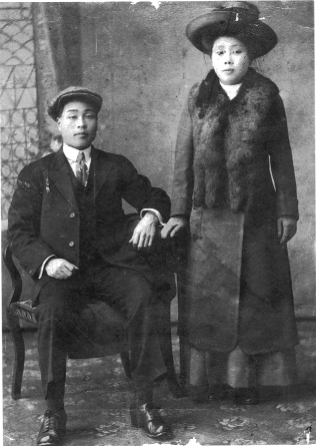
Voyage to America
We boarded a big passenger ship in Kobe in December of 1913. I remember feeling lonely on the ship because men and women were separated during the voyage. The Great Earthquake had just hit San Francisco (landing card), and the city was still a ruin, so we went to Seattle, where entering the states was easier.
After Seattle, we boarded a train for Texas. We paid sixty dollars for a sleeper car. We arrived in Houston three days later. At the time, Houston wasn't all that developed. The roads were muddy, just as they were in Japan. The place where we were going to live was a rice farm, which was far away from the towns, and there were few Caucasians except for a Russian mechanic and his family. Some Japanese laborers, who passed away without ever returning to Japan, lived nearby.
I wasn't shocked when I moved to Pierce (near Wharton), and my brother was surprised not to receive a letter saying I was. I had lived in Yokohama, Kobe and Osaka and after those cities, nothing could surprise me. I was brought up in the home of a village councilman. I met people who gave me horseback rides, and we also had a kettle. I wasn't surprised to see Indian cows in America. I was 17 years old. When I first arrived, I thought about how far I had come. These days, Japanese people sometimes visit rice farmers in Texas, but there's no one here anymore.
Life in Pierce and Webster
Our house burned down once in Pierce, TX. During this time, I learned to bake all kinds of things: bread, cake, biscuits and doughnuts. We missed Japanese food, so I often made taiyaki and manju. I had special tools for making soy sauce and soybean paste, so we made these things with other families. We had to pay a special tax to make soy sauce. Soy, sausage, and azuki beans were available, so whenever we had festivals or other special events, I would make manjus and azuki rice. Kagawa made molds out of tin, so on Saturdays and Sundays we had a good time making cakes and other treats. Watching the yeast rise while I made bread was incredible to me; I'd never used yeast in Japan. I baked bread every day to forget my homeland.
There weren't many Japanese things in America, so what I missed about Japan, I made for myself. I made small futons out of Nagajubon (a kind of underware worn under a kimono) and stuffed them with cotton. I also made Kayas (called ‘mosquito nets' in America) out of white net, so they matched to color of the rooms. I made a Japanese bath. I wanted to build a Japanese garden, but I couldn't find the right rocks and stones in Texas. I asked another Japanese woman living nearby how to make kimonos using a sewing machine. Not only was it fun, it distracted me from my homesickness. Sadly, the person who taught me how to make the kimonos soon moved to Los Angeles.

The soil of the farm had grown old, and unsuitable for rice farming. At first, we tried to grow cotton and corn, but neither crop succeeded, and we decided to close the farm and return to Japan. Right after we decided to go back, Onishi gave us a piece of land in Webster to express his gratitude, and asked us to grow rice on that land. We decided to stay in America. I wanted to go home, and canceling our return made me sad.
We moved to Webster, I saw long-waisted dragonflies and lightning bugs, neither of which I had seen since arriving in America. At night, I was surprised to see so many lightening bugs flying around. Also, so many butterflies filled the air in Webster that the sky sometimes looked yellow. After we sprayed the farm, we stopped seeing the butterflies. Sometimes, there were so many mosquitoes outside that the air looked black, and we stayed inside. When we first came to Webster, we had Sundays off, so we went to the coast to catch crabs. Eventually, we started working on Sunday.
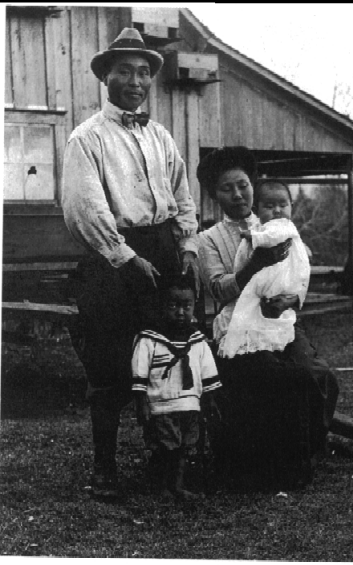

Nihonginkai (an organization for Japanese immigrants in America) was
formed and we met once a year in Galveston for a picnic. In Houston,
a group of Japanese started a club where we could see Japanese singers,
and there I saw the famous Japanese singer, Yoshie Fujiwara. I also saw
Japanese movies whenever I could.
Since coming to America, I have read so much. When Onishi returned to Japan, he sent us many books more popular with men than women. In order to distract myself from my loneliness, I read those books at night, by lamplight. Because I read so much Japanese, I never learned English very well.
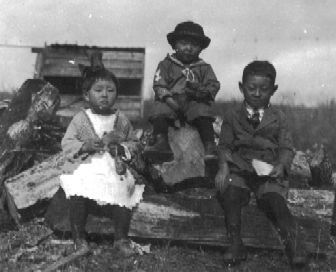
Mexican people who worked with us ate a lot of beans cooked with a little oil and lard. They hardly ate meat, but they worked very hard. Caucasians people also liked the beans, and asked us for them occasionally. The Mexicans sometimes had wild parties; a small band would play Mexican dancing music, and kegs of beer were tapped. Sometimes, the parties grew violent, and some people shot one another dead.
Many Japanese tried to immigrate illegally to the United States. If they were found out, the Immigration Officials would come and send them back to Japan. Japanese families in Webster hired some of these illegals. Amongst them were three young men, all in their early twenties. One morning, they started a fight, and one of them was stabbed with a knife. Around four in the morning, a man in a blood-drenched T-shirt rushed into my house, soon followed by the man who had stabbed him. I had no idea what to do; called the doctor to look at the man's wounds. His hand and stomach were both badly wounded, and the doctor treated both injuries. Later, the doctor told us that if the man hadn't covered his stomach with his hand when he was stabbed, the knife wound would've been fatal. Had the police found out about the incident, all three men would have been deported; fortunately, the doctor was a friend of ours, and agreed to say nothing. Fifty years after that night, I received a letter from the man who had been stabbed. Inside was a letter expressing his gratitude and five hundred dollars.
I'm just sitting here by the window, looking at cherry blossoms in the sun. Because of last year's drought, I thought the cherry tree had died, but it didn't. We also have persimmon trees and peach trees here. Both grew from seeds we threw away in the yard. They used to be tall as I am now, but now they're huge, and they bear a lot of fruit. Looking at the persimmon tree reminds me of leaving Japan. I can't forget the delicious taste of those persimmons and figs.
I often see mockingbirds pecking at peaches. Peaches here aren't nearly as good as the ones I ate back home as a little girl. It's common for Caucasians to eat peaches in the morning with sugar and cream. We also have cherries here; some taste good, others don't.
From middle of September to the middle of November, many people suffer
from something called hay fever. If you have this problem, your nose
runs, and your eyes itch and turn red. I've dealt with hay fever for
thirty years.
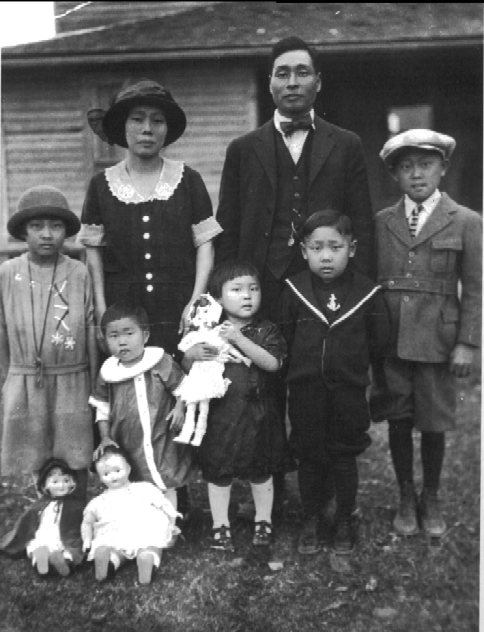
World War II
During World War II, no one forced us to go to an internment center, and none of us were bullied in Webster. The men, however, were taken to a nearby town for about a month while the government checked their backgrounds. One black woman named Heburna cooked pinto beans with bacon and ham for us in the morning. She also baked cornbread, biscuits and bread.
During World War II, because there were so many Ises (first generation Japanese) amongst us, people in town treated us as usual. After the war ended, we started sending clothes back to Japan. When we sent chocolate and marshmallows to Japan, I heard little children jumped for joy, saying, “It must be like Heaven in the States! They have so much delicious food.”
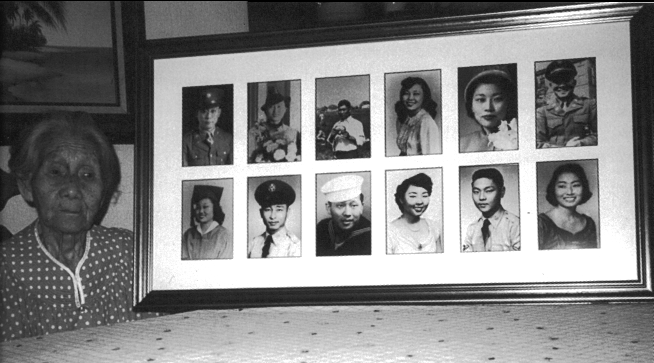
Giving Birth to Twelve
Children
Although I gave birth to many children, my children don't understand the Japanese language very well, so these days I've been feeling very lonesome. My oldest daughter, Ruth and I were like sisters, and we got along well. All of our boys were good baseball players even though they had small bodies. Henry's school principal took Henry to every school game, saying that if Henry didn't play, the team would lose. My fourth son, Benjamin, was the football captain. He would often come home from practice with scratches on his face. Franklin, our fifth son, was good at basketball. Lucy, our third daughter, quit college in her sophomore year because the war began. Right now, William, my second son, and Chris, my sixth son, takes care of me, so I walk around the house, going to bed and getting up occasionally during the day. Now, I can cook rice, but I'm not able to cook other dishes, so Nina comes to Webster early in the morning on weekends to clean the house and look after me.

There are only a few isseis who were able to go back to
Japan. The only people who have survived are Kobayashi, who is 101 years
old (she lives in the neighborhood) and myself. There are hardly any
old-timers like us left in Webster. Kobayashi is too old to walk, so
when her older daughters come to care for her, I sometimes visit and
try to talk with her. She's usually too weak to talk with me.
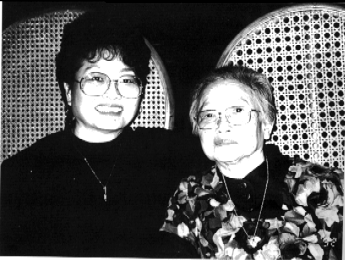
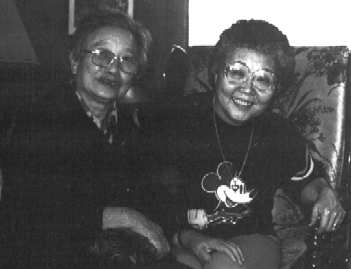
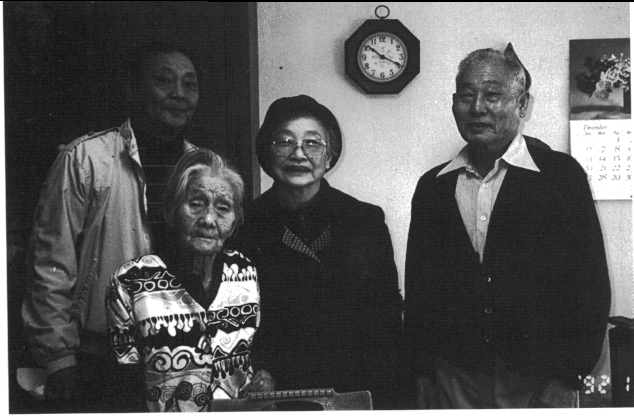
Epilogue
On November 24, 1992, I flew to Houston, Texas where my aunt Kichi lived. I was 77 years old, in a wheelchair, and Kichi, 96 years old. “It makes me weep when I imagine that my children will live their lives in America as Americans, without knowing anything about Japan after I die.” This grief of my aunt, expressed in many of her letters, made me decide to go to Texas.
Kichi cried as soon as I arrived at her house. Kichi never let me go anywhere without her during my eight-day stay in Texas; even when I wanted to go to the bathroom, she followed me. Her second son, William, sometimes said to Kichi, “You'll lose your voice!” while I was there, because she constantly spoke so loudly. On December 1 st , my last day in Texas, Kichi came outside on the porch to see me off. We cried, embracing each other.
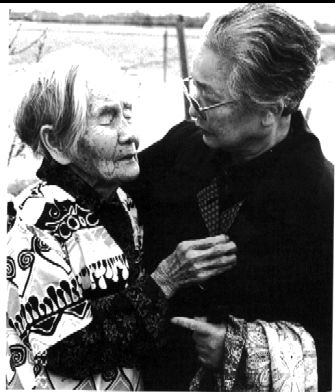
After I returned to Japan, I received a letter from Kichi saying she was sorry that she couldn't entertain me more. She also wrote some things she felt she couldn't talk to me about while I was with her in Texas. After sharing with me the sad memories she hadn't been able to share with anyone, she stopped writing, as though she was relieved. Three years later, I received the news that she had passed away. She was 99 years old.
I have translated this diary of her life in America so that her children and their children might better understand and remember her.
Sumiko Murao
